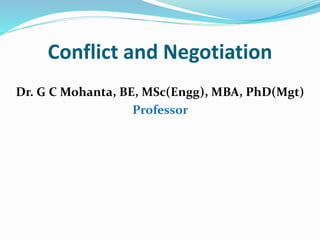
Conflict & negotiation
- 1. Conflict and Negotiation Dr. G C Mohanta, BE, MSc(Engg), MBA, PhD(Mgt) Professor
- 2. What is Conflict? Conflict is the process that begins when one party perceives that another party has negatively affected, or is about to negatively affect, something that the first party cares about. Conflict is the self-interested struggle that arises when the goal-directed behavior of one person or group blocks the goal-directed behavior of another person or group. Interpersonal conflict is a process that occurs when one person, group, or organizational subunit frustrates the goal attainment of another.
- 3. Level of Conflict on Organizational Performance
- 4. Sources of Conflict Differentiation Differences in functional orientations Status inconsistencies Task relationships Overlapping authority Task interdependencies Incompatible evaluation systems Scarcity of resources
- 5. Different Views on Conflict Traditional View – conflict is harmful and must be avoided Human Relations View – conflict is a natural and inevitable outcome in any group and need not be negative Interactionist View – conflict is encouraged to prevent group from becoming stale, some conflict is absolutely necessary
- 6. Different Views on Conflict (Contd.) Functional conflict - supports the goals of the work group and improves its performance Dysfunctional conflict - prevents group from achieving its goals
- 7. Types of Conflict Task conflict - content and goals of the work low-to-moderate levels are functional Relationship conflict - interpersonal relationships almost always dysfunctional Process conflict - how work gets done low levels are functional
- 8. Pondy’s Model of Organizational Conflict Conflict is a process that consists of five sequential stages Stage 1: Latent conflict - no outright conflict exists, but there is a potential for conflict because of several latent factors Sources of conflict include: Interdependence Difference in goals and priorities Bureaucratic factors Incompatible performance criteria Competition for scarce resources
- 9. Pondy’s Model of Organizational Conflict (contd.) Stage 2: Perceived conflict - subunits become aware of conflict and begin to analyze it Conflict escalates as groups battle over the cause of conflict Stage 3: Felt conflict - subunits respond emotionally to each other, and attitudes polarize into “us-versus-them” Cooperation between units decreases What began as a small problem escalates into huge conflict
- 10. Pondy’s Model of Organizational Conflict (contd.) Stage 4: Manifest conflict - subunits try to get back at each other & organizational effectiveness suffers Fighting and open aggression Violence Sabotage Physical intimidation Lack of cooperation Passive aggression – doing nothing Stage 5: Conflict aftermath - conflict is resolved in some way If sources of conflict are not resolved, the dispute will arise again
- 11. Individual-Level Conflict Management Manager meets with employees in conflict. All understand facts of conflict Manager summarizes dispute in written form Manager discusses facts in report with each employee separately and works out a common solution Manager gets commitment to resolving dispute
- 12. Group-Level Conflict Management Avoiding Accommodating Competing Compromise Collaborating
- 13. Avoiding A conflict management style characterized by low assertiveness of one’s own interests and low cooperation with the other party. It might be a sensible response when: The issue is trivial. Information is lacking. People need to cool down. The opponent is very powerful and hostile.
- 14. Accommodating A conflict management style in which one cooperates with the other party, while not asserting one’s own interests. It can be an effective strategy when: You are wrong. The issue is more important to the other party. You want to build good will.
- 15. Competing A conflict management style that maximizes assertiveness and minimizes cooperation. It can be effective when: You have a lot of power. You are sure of your facts. The situation is truly win-lose. You will not have to interact with the other party in the future.
- 16. Compromise A conflict management style that combines intermediate levels of assertiveness and cooperation. It is a sensible reaction to conflict stemming from scarce resources and it is a good fall-back position if other strategies fail.
- 17. Collaborating A conflict management style that maximizes both assertiveness and cooperation. It is an attempt to secure an integrative agreement that fully satisfies the interests of both parties (a win- win resolution). It works best when the conflict is not intense and when each party has information that is useful to the other.
- 18. Negotiation Negotiation is the process in which two or more parties exchange goods or services and attempt to agree on the exchange rate for them
- 21. Individual Differences in Negotiation Personality Gender Cultural
- 22. Personality The best distributive bargainer appears to be a disagreeable introvert Those who can check their egos at the door are able to negotiate better agreements
- 23. Gender Differences in Negotiation Men have been found to negotiate better outcomes than women, although the difference is relatively small Women may unduly penalize themselves by failing to engage in negotiations when such action would be in their best interest
- 24. Cultural Differences in Negotiations Cultural context significantly influences The amount and type of preparation for bargaining The relative emphasis on task versus interpersonal relationships The tactics used Where the negotiation should be conducted
- 25. Improving Negotiation Skills Set Ambitious Goals Pay Little Attention to Initial Offers Research Your Opponent Address the Problem, Not the Personalities Be Creative and Emphasize Win-Win Solutions
